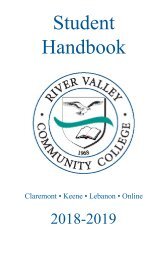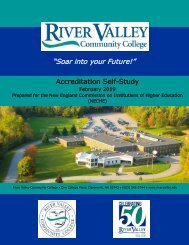Create successful ePaper yourself
Turn your PDF publications into a flip-book with our unique Google optimized e-Paper software.
mode of delivery when there is a need. Students are informed about the online learning<br />
environment on the <strong>RVCC</strong> website. River Valley has steadily increased its online learning<br />
opportunities over the past five years and now offers approximately 32-34 courses each<br />
fall semester in a completely online format.<br />
As previously described, faculty performance in both the face to face and online classroom<br />
is assessed on a standard schedule as outlined in the CBA. When areas of concern arise<br />
related to the quality of teaching and learning, it is the responsibility of the Department<br />
Chair to develop a plan, in conjunction with the individual faculty member, to remediate<br />
the issue. For many years there has been a set monthly meeting dedicated to Teaching &<br />
Learning for faculty. This had been organized by a full-time faculty member and open to<br />
full and adjunct faculty as well as any staff or administrators who wished to join. Topics<br />
covered in the past three years included subjects such as: Guided Pathways, Rethinking<br />
Student Instruction, Social Learning Theory & Bloom’s Taxonomy, Mentoring Students and<br />
Developing their Motivation to Persist and Do Well, Connections Between Academic<br />
programs and Developmental courses, Developing Rubrics, and Problem Based Learning.<br />
Professional Development<br />
Each year, <strong>RVCC</strong> participates in the CCSNH Symposium during which various workshops<br />
are available for faculty. The workshops vary in topic based on faculty and staff input<br />
across the system, but a number of workshops each year relate to topics that may be<br />
utilized to enhance quality in the classroom. Topics in recent years have included The<br />
Flipped Classroom, Mindfulness in Education, and Podcasting lectures.<br />
Faculty also have access to on-line professional development courses through the library<br />
on such topics as Evaluating Sources and Open Educational Resources. In Spring of 2018,<br />
all advisors, and interested staff and faculty were trained in NOABO/Veera Bridge (which<br />
allows access to programmatic enrollment data.) As <strong>RVCC</strong> and CCSNH prepared to<br />
transition to Canvas in Summer of 2018, there were also a number of formal trainings on<br />
the Learning Management System at the department and college level lead by members of<br />
the faculty who had prior experience using Canvas.<br />
Faculty and staff are provided the additional benefit of taking courses at any System<br />
institution for free through an employee waiver program. All employees must have<br />
permission of their supervisors to do this.<br />
Exposure of Students to Various Instructors<br />
At <strong>RVCC</strong>, all associate degree programs have a required Liberal Arts component as<br />
outlined by the Board of Trustees Academic Policy and as described in Standard 4. These<br />
requirements ensure that any student in an associate degree program taking Liberal Arts<br />
courses as part of their program of study are taught by faculty with educational experience<br />
or expertise in their field. Technical courses in each program are taught by faculty with<br />
educational experience, expertise, licensure, or certification in the specific field of study.<br />
Course outlines are a college-wide document, approved by the Curriculum Committee,<br />
which specify the description, objectives, outcomes, and teaching methods for a particular<br />
course. This document ensures that multiple sections of a course that are taught,<br />
regardless of instructional mode (face to face, hybrid, or online) are consistent for all<br />
sections of the same course. The course outline also includes grading scales to ensure<br />
equity in grading. When multiple faculty teach the lecture or lab sections of a course, the<br />
89 | P a g e





